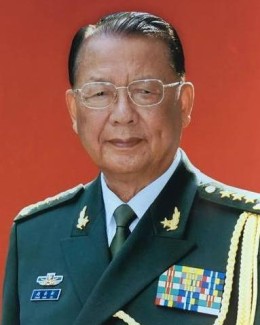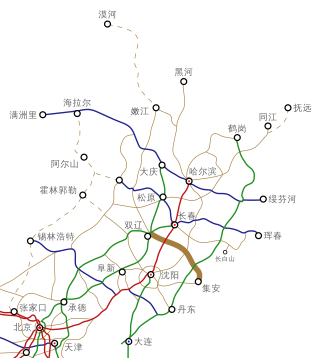
The South Manchuria Railway, officially The South Manchuria Railway Company, Ltd., Mantetsu or Mantie for short, was a large National Policy Company of the Empire of Japan whose primary function was the operation of railways on the Dalian–Fengtian (Mukden)–Changchun corridor in northeastern China, as well as on several branch lines.

North Gyeongsang Province is a province in eastern South Korea, and with an area of 19,030 km2 (7,350 sq mi), it is the largest province in the Korean peninsula. The province was formed in 1896 from the northern half of the former Gyeongsang province, and remained a province of Korea until the country's division in 1945, then became part of South Korea.

Dandong, formerly known as Andong, is a coastal prefecture-level city in southeastern Liaoning province, in the northeastern region of People's Republic of China.

This article looks at the economies of Manchukuo and Mengjiang, in the period 1931-1945. The effective Japanese annexation of 1931 led to a colonial system. Japan invested in heavy industry, and to a lesser extent, agriculture.

Baishan (Chinese: 白山; pinyin: Báishān, is a prefecture-level city in southeastern Jilin province, in the Dongbei part of China. "白山" literally means "White Mountain", and is named after Changbai Mountain. Baishan borders Yanbian to the east, Tonghua to the southwest, Jilin City to the north, and North Korea to the south.

Liaoyuan is a prefecture-level city in Jilin province, People's Republic of China. It is bounded on the west and south by Tieling of Liaoning province, west and north by Siping, and east by Tonghua and Jilin City. Liaoyuan lies some 100 km (62 mi) south of Changchun, the provincial capital. Covering an area of 5,125 km2 (1,979 sq mi), Liaoyuan is the smallest among the prefecture-level divisions of Jilin. Liaoyuan has a total population of 1,176,645 in the prefecture, while the urban area has a population of 462,233.

Tonghua is a prefecture-level city in the south of Jilin province, People's Republic of China. It borders North Korea's Chagang Province to the south and southeast, Baishan to the east, Jilin City to the north, Liaoyuan to the northwest, and Liaoning province to the west and southwest. Its population was 1,812,114 registered residents at the 2020 census living in an area of 15,195 square kilometres (5,867 sq mi). Its built-up area made of the two urban districts was home to 446,917 inhabitants. It is known as one of the five medicine production centres in China.

Andong, or Liaodong, was a former province in Northeast China, located in what is now part of Liaoning and Jilin provinces. It was bordered on the southeast by the Yalu River, which separated it from Korea.

The Pacification of Manchukuo was a Japanese counterinsurgency campaign to suppress any armed resistance to the newly established puppet state of Manchukuo from various anti-Japanese volunteer armies in occupied Manchuria and later the Communist Northeast Anti-Japanese United Army. The operations were carried out by the Imperial Japanese Kwantung Army and the collaborationist forces of the Manchukuo government from March 1932 until 1942, and resulted in a Japanese victory.

Tang Juwu, Tang Chu-wu, 唐聚五,(20 April 1898 – 18 May 1939), Chinese officer, general of one of the Anti-Japanese Volunteer Armies resisting the pacification of Manchukuo.
The Northeast People's Counter-Japanese Volunteer Army was led by Tang Juwu, formerly the commander of a Northeastern infantry regiment, interned by the Japanese at the beginning of the invasion of Manchuria. It was created by the Northeast National Salvation Society that had appointed Tang as commander following his escape from the Japanese, and helped him link with the local forces which others were organising. Tang also made use of his personal contacts with police chiefs, officials, local gentry militias and the leaders of the Big Swords Society. Tang was able to organize a force which threatened the region to the east of Mukden and communications with Korea.

Zhao Nanqi, or Cho Nam-gi (Korean: 조남기), was a General of the People's Republic of China and Vice Chairman of the Chinese People's Political Consultative Conference from 1998 to 2003, and Vice-chairman of the 5th National People's Congress.
The Japanese 5th Army was an army of the Imperial Japanese Army based in Manchukuo from the Russo-Japanese War until the end of World War II. During World War II it was under the overall command of the Kwantung Army.

The G1112 Ji'an–Shuangliao Expressway, commonly referred to as the Jishuang Expressway, is an expressway that connects the cities of Shuangliao, Jilin, China, and Ji'an, Jilin. The Jishuang Expressway passes through Shuangliao, Siping, Liaoyuan, and Tonghua, before finally ending in Ji'an.
Tonghua Sanyuanpu Airport, also known as Tonghua Liuhe Airport, is a dual-use military and civilian airport serving the city of Tonghua in Jilin Province, China. It is located in the town of Sanyuanpu in Liuhe County, 50 kilometers from the city center. Originally a military airport, construction to convert it to civilian use started in October 2009 with a total investment of 370 million yuan. It was opened on 18 June 2014, becoming the fifth civilian airport in Jilin.

Jinzhou Province was one of the provinces of Manchukuo. It was established 1934, when the old Fengtian Province was split into the Andong Province, Fengtian Province and Jinzhou Province. Jinzhou was mostly Chinese with Korean minorities within it too. The Province mostly acted as a place for Japanese use of its resources and its use for invading China due to its closeness to the country.

Liu Zhongde was a politician of People's Republic of China, he was a standing committee member of the 9th and 10th Chinese People's Political Consultative Conference, and a member of the 14th CCP Central Committee, he served as Minister of Culture of the People's Republic of China from December 1992 to March 1998, as deputy head of the Propaganda Department of the Chinese Communist Party from June 1990 to 1998, as deputy secretary general of the State Council from May 1988 to 1990, and vice chairman of the Ministry of Education of the People's Republic of China from June 1985 to May 1988.

The China Railways SL8 class steam locomotive was a class of 4-6-2 express passenger steam locomotives operated by the China Railway. They were originally built for the South Manchuria Railway (Mantetsu) and the Manchukuo National Railway between 1937 and 1940.
The China Railways TH10 class steam locomotive was a class of 4-6-0 passenger steam locomotives operated by the China Railway. Originally amongst the first locomotives ordered by the South Manchuria Railway (Mantetsu), they were later operated by the privately owned Jichang Jidun Railway and its successor, the Manchukuo National Railway, which designated them Tehoni class. The "Teho" name came from the American naming system for steam locomotives, under which locomotives with 4-6-0 wheel arrangement were called "Ten-Wheeler".

The China Railways TH1 class steam locomotive was a class of 4-6-0 passenger steam locomotives operated by the China Railway. Originally built for the South Manchuria Railway (Mantetsu), some were also operated by the Manchukuo National Railway. The "Teho" name came from the American naming system for steam locomotives, under which locomotives with 4-6-0 wheel arrangement were called "Ten-Wheeler".















